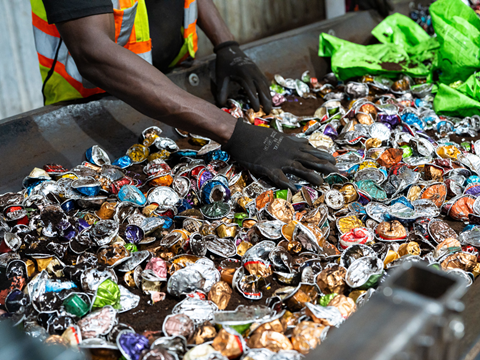
Nespresso Canada and Éco Entreprises Québec will expand their ‘green bag’ coffee capsule recycling programme across all Quebec municipalities, aiming to simplify the recycling process while complying with EPR.
Selective collection systems are being modernized as extended producer responsibility enters into force in Quebec.
Consumers are encouraged to place their used Nespresso coffee capsules in the green bags. These are supplied free of charge with every Nespresso online order; alternatively, they are available in-store and via the Nespresso Club.
Filled green bags can then be placed in a residential recycling bin with other recyclable materials. The aluminium capsules are subsequently recycled, while the coffee grounds are utilized in the biomethanization process in the province.
Quebec is reported to be the second Canadian province to enforce the green bag programme throughout its territory (Prince Edward Island being the first), and Nespresso anticipates its nationwide adoption in the future.
Certain regions of Ontario, New Brunswick, and Nova Scotia have also embraced the system in a bid to facilitate ‘easy and effective’ coffee capsule recycling.
“The expanded rollout of the green bag programme throughout the province has been a Nespresso priority for years,” said Carlos Oyanguren, president of Nespresso Canada. “In fact, Quebec was where the green bag programme was first launched in 2016.
“We are proud of the enthusiasm this programme has generated among consumers and municipalities, and of being able to make this easy recycling solution available province-wide.
“For over a decade, Nespresso has been playing a key role in reducing waste in the country by implementing innovative recycling solutions. Combining quality and sustainability has always been at the heart of our DNA.”
Maryse Vermette, President and CEO of Éco Entreprises Québec, added: “This recovery and recycling solution, the result of an agreement between Éco Entreprises Québec and Nespresso and made possible with EPR, is part of the circular economy dynamic.
“Throughout Quebec, we encourage the public to make the right thing when sorting – for containers, packaging, and printed paper – and this now includes Nespresso aluminum coffee capsules.”
In similar news, various organizations have partnered with Podback to collect and recycle coffee pods. Starbucks seeks to recycle used Starbucks At Home coffee pods, collected at kerbside or via drop-off points, into beverage cans, supermarket crates, and other packaging applications.
Costa Coffee has also conducted a trial in which consumers were offered free Podback recycling bags in-store; these could then be filled with used coffee pods and returned for recycling. Podback-branded recycling points were established in Costa and Tesco stores, accepting both aluminium and plastic Costa Coffe pods for Nespresso, Tassimo and Nescafe Dolce Gusto machines.
On that note, various supermarkets in the UK are implementing coffee pod recycling infrastructure. Morrisons has announced a nationwide rollout of Podback coffee pod collection points, offering free recycling bags from its customer service desks; Asda has introduced a similar coffee pod recycling service at over 600 of its stores, aiming to incentivize coffee pod users to make recycling their pods part of their regular shopping routine.
If you liked this story, you might also enjoy:
The ultimate guide to the Packaging and Packaging Waste Regulation in 2025
How are the top brands progressing on packaging sustainability?
Everything you need to know about global packaging sustainability regulation in 2025
The key to increasing the use of reusable packaging in supermarkets














No comments yet